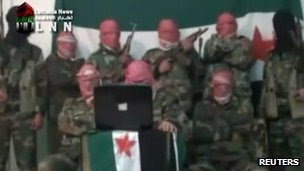Ballot counting at a polling station in Cairo (Ahmed Jadallah/Reuters)
The preliminary results of the Egyptian elections show, as expected, that the Muslim Brotherhood is going to win. The Freedom and Justice Party (FJP), the political arm of the Brotherhood, said in a statement that it is the
biggest winner so far, followed by (the salafist) Al-Nour party and then the Egyptian
Bloc. A spokesman of the Egyptian Bloc confirmed this.
It is believed that the FJP has won about 40% of the party lists and that te Egyptian Bloc, a coalition of several left-liberal parties, among them the Free Eyptians Party of the millionair Naguib Sawiris and the Social Democratic Party, got between 20 and 30%. The Muslim Brotherhood did also well with the individuel lists of workers/farmers and of professionals.
The FJP got most of its votes in Cairo's and Alexandria's popular disrtricts, in Fayoum and in Upper-Egypt, it seems. No surprises there. But the fact that Al-Nour scored as high as it did (particularly in the Delta) gave more reason for astonishment. Other islamist parties, be it moderates like Al-Wasat or radicals like the Jama'a al Islamiyya, also did relatively well. Al-Ahram Online quoted Diaa Rashwan, an expert on Islamic movements and head of the Ahram
Center for Political and Strategic Studies, who said to expect Islamists, including
the FJP, Salafists and Al-Jamaat Al-Islamyia, to win at least 65% of
seats in the first round.
Of course these are preliminary results. And this is also only the first of a series of three election dates on which different parts of Egyt go to the polls. But it's certainly indicative for a trend. It can be expected that the future Egyptian political landscape will be quite interesting, as it wil be dominated by a variety of islamist trends, ranging from the well known, old fashioned politics the old foxes of the Brotherhood use to practise, to the Wasat-liberals who bear a striking resemblance to the Turkish AK Party on the left, and the deeply conservative salafists on the right, who will stress the importance of traditional values above all other things. What is quite interesting as well, though, is that the Qutla, the Egyptian Bloc, did so extremely well. Who had thought that these brand new parties (except for the small leftist Unionist (Tagammu) party that is, which is one of the old ones), in some six months would gain some 20 or even 30%. From scratch. It is almost unbelievable.
An interesting development was that the head of the Muslim Brotherhood’s Freedom and Justice
Party, Mohamed Morsi, Wednesday said that the parliament’s majority will appoint the
new government and that it will be a coalition government. This is not what the military are saying and does not follow the existing scenario. The SCAF is appointing its own governement under Kamal al-Ganzouri irrespective of what the outcome of the elections will be. In fact the new parliament, that will convene not earlier than 17 March 2012, will only serve to write a new constitution. But it is possible that Morsi's remark point to a new challenge for SCAF. Already the military have to deal with the Tahrir-youth who want a government of National salvation with ElBaradei at its head. The Muslim Brotherhood kept its distance from this controversy and also kept away from the last protests at Tahrir. Morsi's remark could mean that the Brotherhood intentionally saved its energy in order to start a campaign for a goverment of its own making only after the elections which it was sure to win anyway.
What was the other news fom Cairo? Yesterday evening a fight broke out between thugs and the protesters of Tahrir who are still there. Shots were fired, knives used and even molotov cocktails were thrown. The thugs, who seemed to have been organized (sent by the military? the ministry of the Interior?) were beaten back after heavy fighting on Adbdel Moneim Riad Square and Mahmoud Bassiouny Street near Tahrir. The paper Al Masry al-Youm mentioned that 108 people got wounded, some 20 of them seriously.
Other news - ven mor bizarre: Egypt is importing no less than 21 tons of teargas from the US. The news came into the open after the port authorities in Suez initially refused to accept a first load of 7,5 tons, for fear that it was destined to use against protesters at Tahrir.
-

.jpg)






































